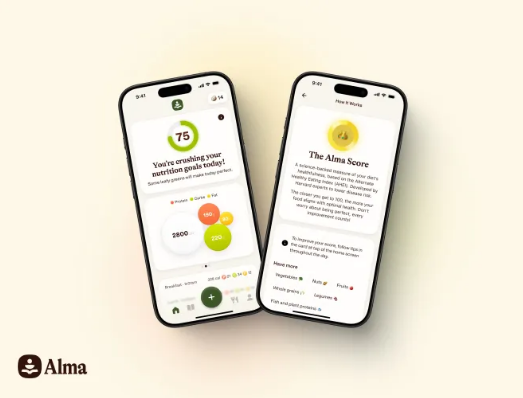With the rapid development of the field of health technology, the AI nutrition application Alma has officially landed on the North American iOS platform, marking a new stage of personalized diet management. Founded by Rami Alhamad, former Vice President of Products at Whoop, combines generative AI with a Harvard nutrition knowledge base, this innovative application aims to revolutionize traditional calorie tracking patterns through natural dialogue and intelligent recognition.
Alma, an AI nutrition application founded by Rami Alhamad, former vice president of product at fitness technology company Whoop, has officially landed on the North American iOS platform today. By integrating generative AI models with Harvard nutrition knowledge base, this application attempts to subvert the traditional calorie tracking model with "dialogue interaction + intelligent recognition", converting tedious manual input into natural dialogue, and providing users with personalized diet management services. .

Image source: Alma
From voice to photos: AI-powered sensorless recording
Unlike traditional applications such as MyFitnessPal, Alma allows users to directly describe their diet content through voice or text. The AI assistant will automatically estimate the amount of food and calories and support taking photos to identify dishes. The application also provides real-time adjustment function - if there is a deviation from the actual intake in AI, the user can manually correct the data. This design directly hits the pain points of traditional nutrition tracking applications: platforms such as MyFitnessPal rely on manual search and input, resulting in a long-term sluggish user retention rate.
Alma's core competitiveness lies in its multimodal interactive experience. In addition to basic tracking functions, AI assistants can recommend customized recipes based on the user's fiber and protein intake targets, and even analyze restaurant menu pictures and provide healthy choice suggestions. The built-in "nutrition scoring system" of the application will generate health indexes based on daily data and push improvement plans. As the frequency of use increases, AI can also learn users' dietary preferences and dynamic optimization suggestions.

Image source: Alma
Technical base and industry ambitions
In order to achieve accurate analysis, Alma integrates a variety of AI models and introduces Harvard University’s nutrition knowledge base to build a professional database. Its team includes several nutrition experts, continuously expanding global food culture data and paves the way for the future expansion of international markets. Currently, the startup has raised $2.9 million from Menlo Ventures and Anthropic, and plans to launch the "Smart Food Pantry" feature - automatically generating adaptive recipes by identifying users' inventory ingredients.
Founder Alhamad said his entrepreneurial inspiration comes from personal experience: "I have repeatedly fought against weight over the past decade and are well aware of the pain of manual recording. The emergence of ChatGPT made me realize that AI can be a personalized nutrition consultant." He believes that , The future of consumer-grade AI is a professional application in the vertical field, rather than a general chatbot. This concept coincides with the view of Shawn Carolan, a partner at investor Menlo Ventures: “When 20 foods are recorded shortened from 30 seconds to a few seconds, user habits will be completely changed.”

Image source: Alma
Challenges and opportunities coexist
Although Alma faces competition from AI nutrition applications such as Healthify and SnapCalorie, it builds differentiated advantages through design aesthetics and interaction fluency. Industry observers pointed out that as the phenomenon of weight loss drugs such as Ozempic spending thousands of dollars a year spreads, the market's demand for non-drug health management programs continues to rise. If Alma can prove that its AI recommendations can replace some nutritionist functions, it may open up a new business picture of "AI+Precise Nutrition". This health revolution driven by generative models is redefining the relationship between humans and food.
The launch of Alma is not only a reflection of technological innovation, but also an important breakthrough in the field of health management. In the future, with the continuous optimization of AI technology, personalized nutrition management will become more intelligent and efficient.